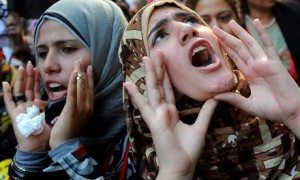By all standards, 2011 was quite an exceptional year for men and women in the Arab world. It was a year of dramatic transitions marked by the so-called Arab Spring of political democratization and social emancipation. It all started in Tunisia, going through Egypt and Libya in the West, and continuing to drag on in both Yemen and Syria in the East. An interesting facet of those transitions related to the role of social media platforms as drivers of revolutions, giving rise to different perspectives about the role of Facebook and Twitter in bringing climatic changes to an already destabilized region. One such perspective related to how social-media-driven revolutions have empowered two main sectors of the population to speak out and have their voice heard: young people and women. In Tunisia and Egypt, some of the key players in demonstrations and protests were young women aspiring for better civic and political opportunities.

The awarding of the Nobel Prize to Yemeni female activist Tawakul Karman attests to the growing role of women in the socio-political transitions. But according to a recent report by the Dubai School of Government, rising women’s activism in the current transitions is not associated with rising female social media usage. In significant ways, this finding provokes questions about how women could be further engaged in the social media revolution as active users to cope with their real-life role as agents of change in their communities. (It should also provoke some questions about how much credit we should give social media for these changes, since they were clearly not the only factor in these revolutions.)
The survey found that, while the numbers of male and female users of Facebook worldwide are roughly equal, women are only a third of Facebook users in the Arab world. The report puts forward a number of barriers limiting social media usages by women. Those include social and cultural constraints placed on women in the region, access to ICT, and lack of relevant content for women. The report also notes that Arab women who do use social media platforms use them to achieve numerous purposes like networking, accessing information and jobs, and activism.
It is clear that some of the reasons keeping women from using social media more are external, suggesting that they can be fixed and worked on by the community. One way to address this issue is to launch more IT and social media training programs to enhance women IT literacy skills and knowledge at universities, schools, and even at home.
On another level, more work should focus on producing content that is relevant to Arab women. This is not only limited to informing women about fashion and beauty, but also about educating them on their rights and responsibilities in their respective communities. Media content should also address different aspects in relation to women like education, health, economics, technology, and so on.
Online content should not only aim at enriching Arab women’s knowledge, but it should also seek to enhance appreciation of their psychological and social concerns listening to them, through different social interaction platforms.
Women-related content should become part of the mainstream news media sites, because statistics show that visitors mainly use the internet to get news. Online media need to do more towards educating both men and women about self development, and encouraging them to obtain their right positions in society.
Online activism and movements have proven to play a significant role in bringing about concrete changes on the ground. The Egyptian and Tunisian experiences have offered ample evidence that through coordinated networking, social and political mobilization would be possible. Of course, for a region long marked by conservative views of women role in building their communities, getting women engaged online may not look like a short-term target. But through systematic education and social empowerment, a greater presence of Arab women in cyberspace could be quite possible in the coming years.











